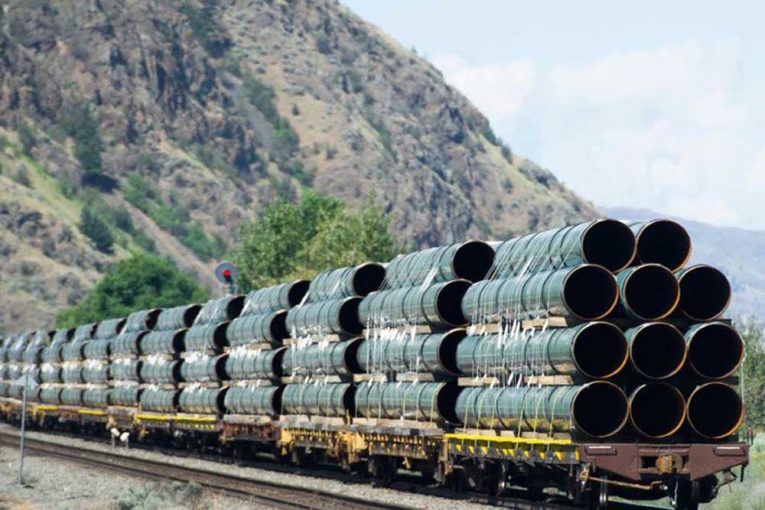
CALGARY – The Supreme Court of Canada has unanimously rejected British Columbia’s move to regulate the flow of heavy oil across its borders, resolving one of the last court challenges to the Trans Mountain pipeline expansion project.
After all-day hearings Thursday, Supreme Court justices dismissed B.C.’s appeal of a lower court decision, which found that interprovincial trade is federal jurisdiction and the flow of commodities such as heavy oil and bitumen should be overseen by federal regulators.
“We are all of the view to dismiss the appeal for the unanimous reasons of the Court of Appeal for British Columbia,” Chief Justice of Canada Richard Wagner said from the bench after dozens of lawyers from across the country presented arguments.
The B.C. Court of Appeal,the province’s highest court, ruled in March 2019 that the province cannot restrict the flow of heavy oil from Alberta across its border.
“At the end of the day, the (National Energy Board) is the body entrusted with regulating the flow of energy resources across Canada to export markets,” Justice Mary Newbury wrote in her decision, which also noted “the (Trans Mountain expansion) project is not only a ‘British Columbia project’.”
“The project affects the country as a whole, and falls to be regulated taking into account the interests of the country as a whole,” she wrote.
The reference case was widely seen as an attempt by B.C. Premier John Horgan’s NDP government to thwart the project.
“The Trans Mountain pipeline project is the only project that would require a hazardous materials permit under the proposed legislation. That is no coincidence,” Maureen Killoran, a partner with Osler, Hoskin & Harcourt LLP acting on behalf of Trans Mountain, said in her argument to the court.
Most arguments centered on the constitutional question of whether B.C. has the legal ability to regulate trade in cases in which it has environmental concerns. But at times the case did veer into broader issues of climate change.
“Environmental protection should be a ‘quasi-constitutional’ principle,” said Harry Wruck, a lawyer with EcoJustice.
“Environmental protection, this court has said, is a fundamental value,” Wruck said.
The argument drew sharp responses from some of the Supreme Court Justices, including Justice Malcolm Rowe, who pointedly asked, “How is it quasi constitutional?”
At various points throughout the day, the justices seemed to fluster lawyers intervening in the case by interrupting their arguments with pointed questions about the constitution, divisions of powers between provinces and the federal government and the intent of the B.C. reference case.
The quick resolution of the case is a major positive for the 590,000-barrels-per-day Trans Mountain pipeline expansion project, which is currently under construction between Edmonton and Vancouver.
The project affects the country as a whole, and falls to be regulated taking into account the interests of the country as a whole
The Canadian oilpatch has struggled to build new export pipelines in recent years. But, in recent months, the sector has enjoyed a string of court wins and milestones as all three active pipeline proposals are moving forward, including Trans Mountain, Enbridge Inc.’s Line 3 project and TC Energy Corp.’s Keystone XL pipeline.
Business Council of Alberta president Adam Legge said he told Finance Minister Bill Morneau on Thursday that corporate sentiment is improving in Alberta because of progress on those pipeline projects, but many Albertans are still concerned about the province’s economy.
““We’ve shared with Minister Morneau that we’re appreciative of things moving forward and we’re getting out of some of the regulatory morass, but the reality is that until Albertans get back to work and get money into their chequing accounts, that’s when I think we’re going to see some of the broader Albertan population concern and sentiment begin to shift.”
“We got into the Trans Mountain pipeline and the expansion because we saw the jurisdictional challenge between the provinces,” Morneau said in Calgary, a city that is still struggling with high unemployment and uncertainty wrought from delays for new pipeline infrastructure.
Morneau was visiting Calgary as part of a series of consultations on the 2020 federal budget.
In 2018, Morneau led the government of Canada’s negotiations to buy the Trans Mountain pipeline and expansion project from Houston-based Kinder Morgan Inc. for $4.5 billion.
Morneau said the Trans Mountain pipeline project is not “a direct factor in my current budget deliberations” and did not have an updated cost estimate for the project, which lawyers for Trans Mountain said last month could cost $10 billion.
The case was the catalyst that led to the federal government’s decision to buy the existing pipeline in May 2018 for $4.5 billion. Kinder Morgan Canada said the political risk that the project would never get built was too much to bear and was planning to halt the expansion.
Although construction on the pipeline is underway, there remain other barriers to its completion, including a legal challenge by Indigenous communities affected by the construction. They argue they were not properly consulted before Ottawa gave the project a green light.
Alberta Premier Jason Kenney took immediately to Twitter to express gratitude for the court decision Thursday.
“Today, the Supreme Court of Canada dismissed B.C.’s attempt to regulate the heavy oil content in a pipeline,” he wrote. “We are very pleased with this outcome and look forward to construction continuing on the Trans Mountain Pipeline.”
— With files from The Canadian Press
• Email: [email protected] | Twitter: geoffreymorgan
You can read more of the news on source
